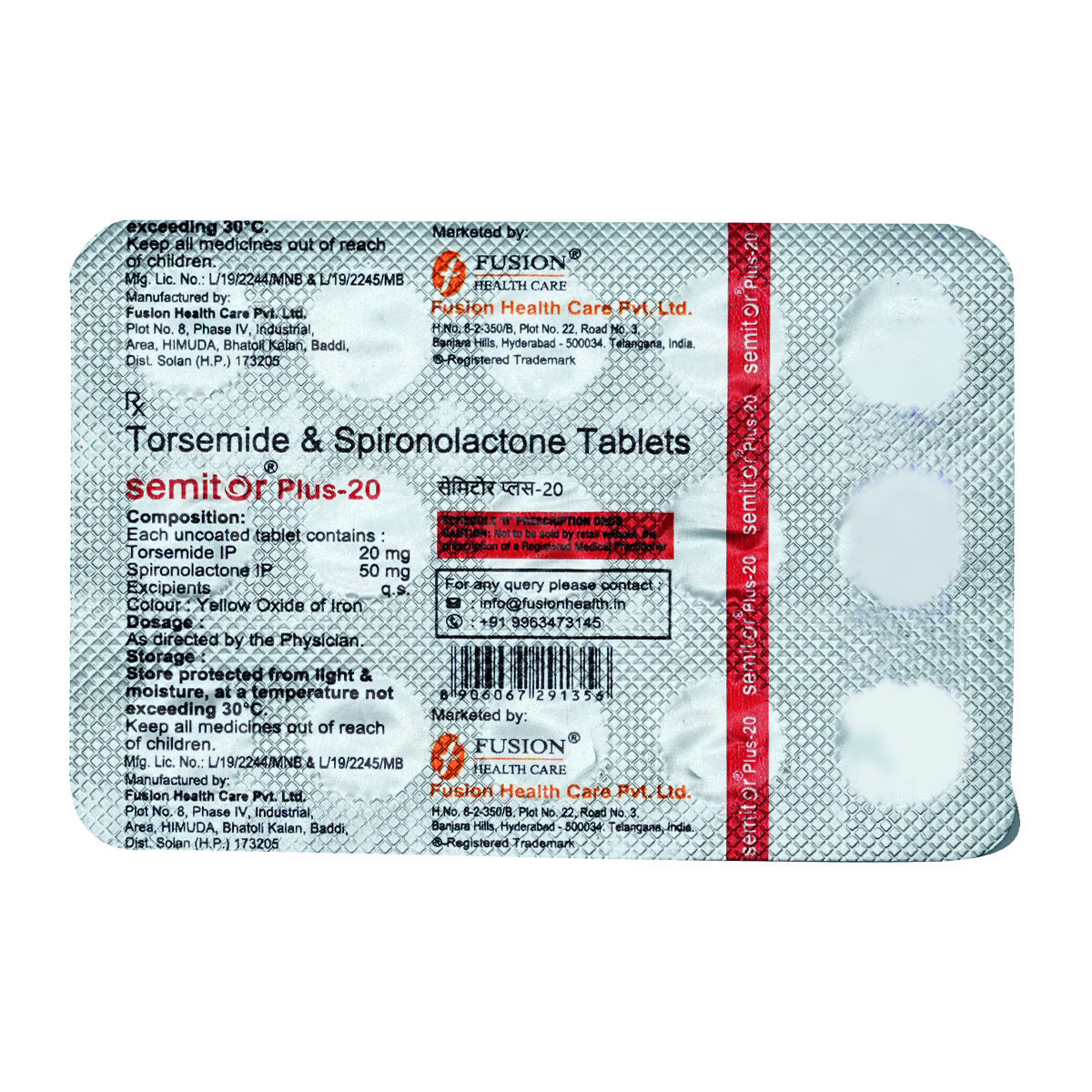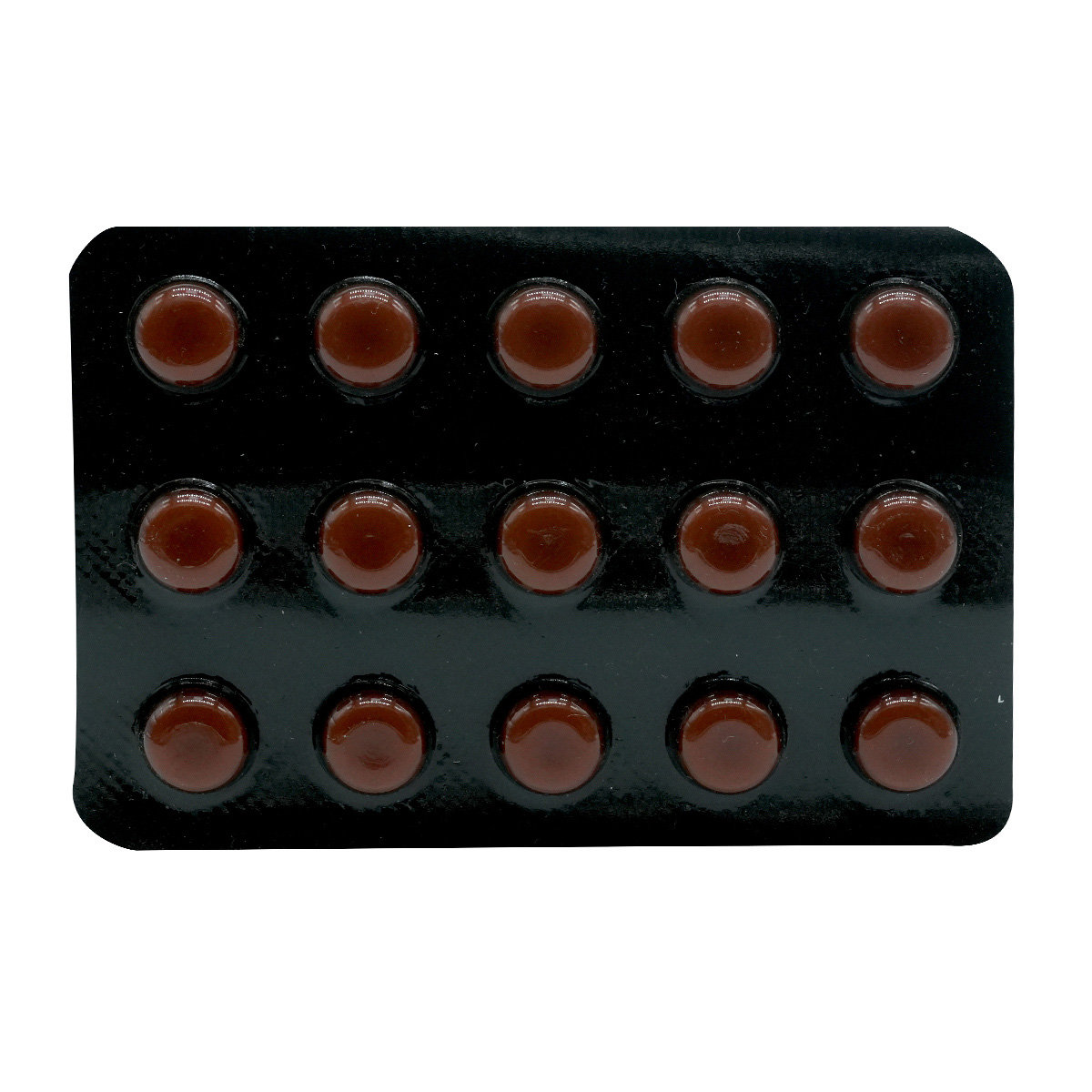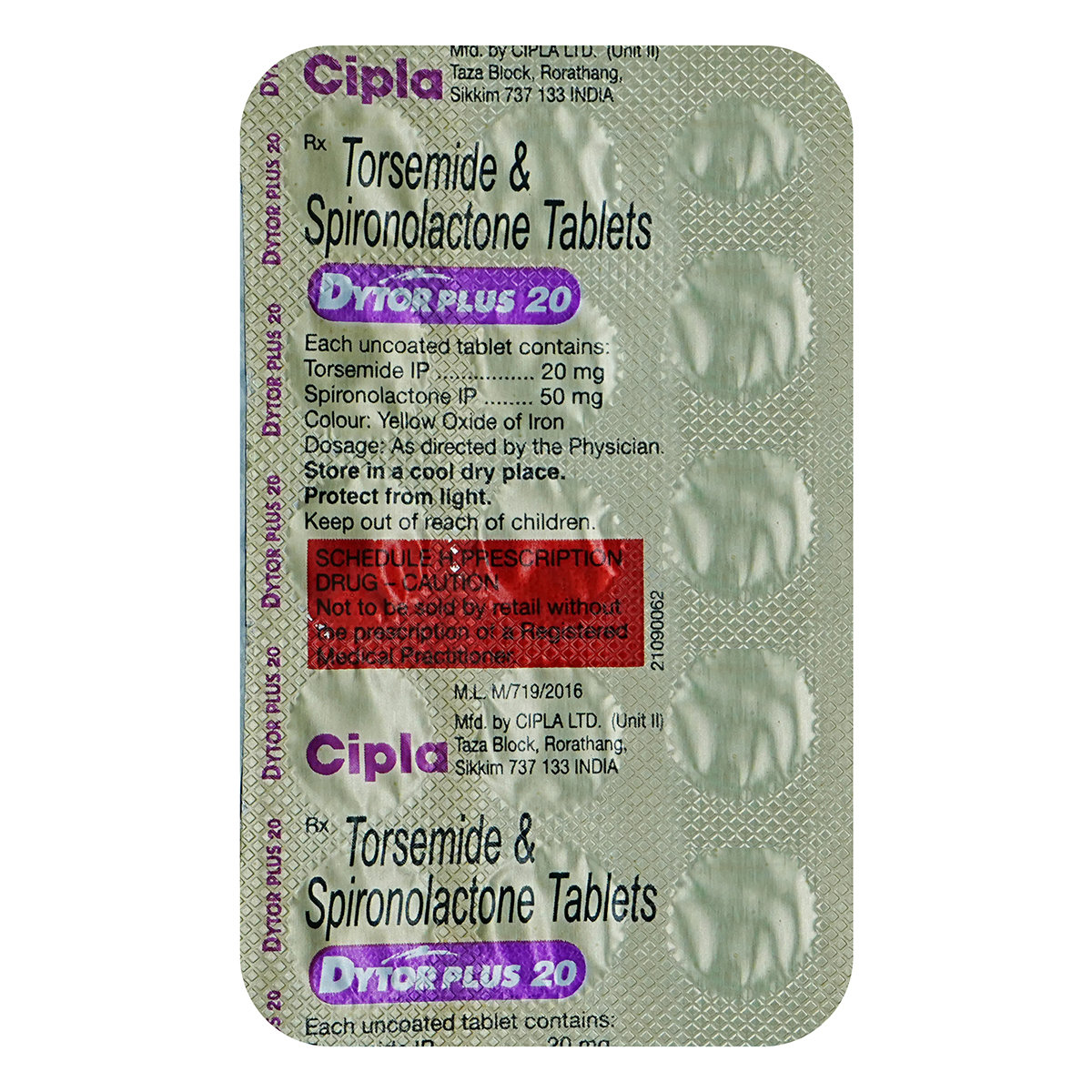Semitor Plus-20 Tablet 15's
MRP ₹167.5
(Inclusive of all Taxes)
₹25.1 Cashback (15%)
Provide Delivery Location
Online payment accepted
 Prescription drug
Prescription drugWhats That
Composition :
Manufacturer/Marketer :
Consume Type :
Expires on or after :
Return Policy :
About Semitor Plus-20 Tablet
Semitor Plus-20 Tablet belongs to a class of medicine called 'diuretics' (water pills), primarily used to remove excess water from the body. It also maintains the bloodstream's potassium level and prevents hypertension (high blood pressure due to oedema (fluid retention). Oedema or fluid overload is associated with pulmonary hypertension (high blood pressure in the lung) or heart failure (irregular heart pumping). Leg swelling is the main characteristic of oedema, accompanied by shortness of breath, chest pain (angina), abnormal heart rhythms (arrhythmia) and swelling in other hands or abdomen areas.
Semitor Plus-20 Tablet is a combination of medication containing Spirolactone and Torsemide. Both spironolactone and torsemide are diuretics and are prescribed for the treatment of resistant oedema (fluid overload) associated with pulmonary hypertension (high blood pressure in the lungs), heart failure, and hepatic cirrhosis (chronic liver damage). Semitor Plus-20 Tablet works by increasing the amount of urine that is passed out from the kidneys. It effectively reduces excess fluid levels in the body and treats oedema (swelling) associated with heart, liver, kidney or lung disease. This reduces the heart's workload and makes the heart more efficient at pumping blood throughout the body. Thus, it also helps lower high blood pressure, reducing the chances of any future heart attack, stroke or angina (chest pain) in the future.
You can take Semitor Plus-20 Tablet with food or without food with a glass of water. Take it preferably in the daytime to avoid frequent urination in the nighttime. Do not chew, crush or break it. Your doctor will advise you how often you take Semitor Plus-20 Tablet based on your medical condition. In some cases, you may experience dehydration, electrolyte disturbances (potassium and sodium), headache, nausea, or dizziness. Most of these side effects of Semitor Plus-20 Tablet do not require medical attention and gradually resolve over time. However, if the side effects are persistent, reach out to your doctor.
Try not to stop taking Semitor Plus-20 Tablet of your own as doing so may raise your blood pressure, thereby increasing the risk of getting heart diseases and stroke. Inform your doctor if you are suffering from any kidney, liver or heart disease. If you are pregnant or breastfeeding, please tell your doctor so that the dosage of Semitor Plus-20 Tablet can be prescribed accordingly. Please tell your doctor if you are taking any other medicines or are allergic to Semitor Plus-20 Tablet . Reducing the amount of table salt (sodium chloride) in your food often relieves the body's swelling.
Uses of Semitor Plus-20 Tablet
Directions for Use
Key Benefits
Semitor Plus-20 Tablet is a combination of medication containing Spirolactone and Torsemide. Both spironolactone and torsemide are diuretics and are prescribed for the treatment of resistant oedema (fluid overload) associated with pulmonary hypertension (high blood pressure in the lungs), heart failure and hepatic cirrhosis (chronic liver damage). Semitor Plus-20 Tablet works by increasing the amount of urine that is passed out from the kidneys. It effectively reduces excess fluid levels in the body and treats oedema (swelling) associated with heart, liver, kidney or lung disease. This reduces the heart's workload and makes the heart more efficient at pumping blood throughout the body. Thus, it also helps lower high blood pressure, reducing the chances of any future heart attack, stroke or angina (chest pain) in the future.
Storage
Drug Warnings
Semitor Plus-20 Tablet should not be given to the people allergic to Semitor Plus-20 Tablet , have low blood pressure (less than 90 mm of Hg), have had a heart attack, kidney disease (with creatinine clearance less than 30 mL/min), liver disease, pregnant women, or planning to get pregnant and breastfeeding women. Besides this, it is contraindicated in low blood pressure (hypotension), cardiogenic shock (sudden stopping of blood flow to the heart), and aortic stenosis (heart valve problem). Semitor Plus-20 Tablet can pass into breast milk, but its effect on the baby is unknown, so it is better to tell your doctor if you are taking Semitor Plus-20 Tablet and breastfeeding. Dehydration with electrolyte and acid-base disturbances must be corrected before using Semitor Plus-20 Tablet . Do not take any extra potassium supplements or potassium-rich foods such as bananas and broccoli with Semitor Plus-20 Tablet , as it may lead to an excessive increase in blood potassium level (hyperkalemia). Please take Semitor Plus-20 Tablet at least 4 hours before sleeping to avoid frequent urination at night.
Drug-Drug Interactions
Drug-Drug Interactions
Login/Sign Up
Co-administration of Semitor Plus-20 Tablet can make Desmopressin may increase the risk of hyponatremia (low levels of salt in the blood).
How to manage the interaction:
If you have to use Desmopressin and Semitor Plus-20 Tablet together, a doctor may adjust the dose or monitor you more frequently to safely use both medications. However, if you experience loss of appetite, headache, nausea, vomiting, lethargy (very tired), irritability, difficulty concentrating, weakness, unsteadiness, memory impairment, confusion, muscle spasm, decreased urination, and/or sudden weight gain, contact your doctor immediately as these may be symptoms of water intoxication (water poisoning) and hyponatremia (low levels of salt in the blood). Do not discontinue the medication without consulting a doctor.
Coadministration of Amiloride with Semitor Plus-20 Tablet may increase potassium levels in the blood.
How to manage the interaction:
Taking Amiloride with Semitor Plus-20 Tablet is not recommended as it can result in an interaction, it can be taken if a doctor has advised it. However, consult the doctor if you experience nausea, vomiting, weakness, confusion, tingling in your hands and feet, feelings of heaviness in your legs, a weak pulse, or a slow or irregular heartbeat. It is important to maintain proper fluid intake while taking these medications. Do not stop taking any medication without doctor's advice.
Combining Eplerenone with Spiranolactone may significantly increase potassium levels in the blood which can lead to kidney issues and irregular heart rhythm.
How to manage the interaction:
Although there is a possible interaction between Semitor Plus-20 Tablet and eplerenone, it is not recommended as it can lead to an interaction. You can take these medicines if prescribed by a doctor. Consult a doctor if you experience nausea, vomiting, weakness, confusion, tingling in your hands and feet, feelings of heaviness in your legs, a weak pulse, or an irregular heartbeat. It is essential to maintain proper fluid intake while taking these medications. Do not discontinue any medications without a doctor's advice.
Co-administration of tizanidine with Semitor Plus-20 Tablet may result in low blood pressure.
How to manage the interaction:
Although taking tizanidine and Semitor Plus-20 Tablet together can possibly result in an interaction, it can be taken if your doctor has advised it. However, if you experience symptoms such as blurred vision, dry mouth, dry skin, frequent urination, nausea, and stomach pain, consult a doctor immediately. Do not discontinue any medications without consulting a doctor.
Co-administration of tobramycin with Semitor Plus-20 Tablet increases the risk of toxicity.
How to manage the interaction:
Although taking tobramycin and Semitor Plus-20 Tablet together can possibly result in an interaction, it can be taken if your doctor has advised it. However, if you experience symptoms such as blurred vision, dry mouth, dry skin, frequent urination, nausea, and stomach pain, consult a doctor immediately. Do not discontinue any medications without consulting a doctor.
Co-administration of amiodarone with Semitor Plus-20 Tablet can increase the risk the risk of irregular heart rhythm.
How to manage the interaction:
Taking amiodarone with Semitor Plus-20 Tablet together is recommended to avoid as it can result in an interaction, it can be taken if your doctor has advised it. However, contact a doctor immediately if you experience sudden dizziness, lightheadedness, fainting, shortness of breath, sweating, or rapid heartbeat. Do not discontinue any medications without consulting a doctor.
Co-administration of neomycin with Semitor Plus-20 Tablet can increase the risk of toxicity.
How to manage the interaction:
Although taking neomycin and Semitor Plus-20 Tablet together can possibly result in an interaction, it can be taken if your doctor has advised it. However, if you experience symptoms such as hearing loss, ringing in the ears, vertigo, and kidney problems, consult a doctor immediately. Do not discontinue any medications without consulting a doctor.
Co-administration of Ziprasidone with Torsemide may increase the risk of irregular heart rhythm.
How to manage the interaction:
Co-administration of Ziprasidone with Torsemide can possibly result in an interaction, but it can be taken together if prescribed by a doctor. However, consult a doctor if you experience sudden dizziness, lightheadedness, fainting, shortness of breath. Do not discontinue any medications without consulting a doctor.
Taking Semitor Plus-20 Tablet together with streptomycin may increase the risk or severity of kidney problems.
How to manage the interaction:
Although taking streptomycin and Semitor Plus-20 Tablet together can possibly result in an interaction, it can be taken if your doctor has advised it. However, if you experience symptoms such as blurred vision, dry mouth, dry skin, frequent urination, nausea, and stomach pain, consult a doctor immediately. Do not discontinue any medications without consulting a doctor.
Co-administration of Amikacin with Semitor Plus-20 Tablet may increase this risk of side effects.
How to manage the interaction:
Although taking amikacin and Semitor Plus-20 Tablet together can result in an interaction, it can be taken if a doctor has advised it. However, if you experience symptoms such as ringing in the ears, irregular urination, vomiting, weakness, or muscle cramps. Do not discontinue any medications without consulting a doctor.
Drug-Food Interactions
Drug-Food Interactions
Login/Sign Up
Diet & Lifestyle Advise
- Consume antioxidant-rich food. Blueberries, cherries, tomatoes, squash, and bell peppers are high in antioxidants.
- Eat natural diuretic foods. Asparagus, beets, green beans, grapes, onion, leafy greens, pineapple, leeks, pumpkin, and garlic are all-natural diuretic foods.
- Use healthy cooking oils like soybean, olive, canola, and coconut oil.
- You should avoid refined foods such as white bread, spaghetti, sugar, and red meat.
- Reduce or eliminate Trans fatty acids, which are found in commercially baked items such as cookies, cakes, crackers, French fries, onion rings, doughnuts, and processed foods.
- Avoid consumption of too much salt or salty food.
- Keep your weight under control with a BMI of 19.5-24.9.
- Regular physical activity or exercise like walking improves your blood flow.
- When possible, elevate your legs or the swollen area on a chair or pillows.
- Avoid standing or sitting for extended periods of time.
- Avoid chronic stress as it can raise your blood pressure.
- Spend time with your loved ones to cope with stress and practice mindfulness techniques.
- Quitting smoking and alcohol consumption is the best strategy to lower the risk of many health complications.
Side Effects of Semitor Plus-20 Tablet
- Dehydration
- Electrolyte disturbances (potassium and sodium)
- Increased blood uric acid
- Headache
- Nausea
- Dizziness
Habit Forming
Therapeutic Class
All Substitutes & Brand Comparisons
RX
Dytor Plus 20 Tablet 10's
Cipla Ltd
₹70.5
(₹6.35 per unit)
36% CHEAPERRX
Out of StockTorsip-Plus 20 Tablet 20's
Steris Healthcare
₹168.5
(₹7.58 per unit)
24% CHEAPERRX
Torlica Plus-20 Tablet 10's
Elicad Pharmaceuticals Pvt Ltd
₹88
(₹7.92 per unit)
21% CHEAPER
Drug-Diseases Interactions
Drug-Diseases Interactions
Login/Sign Up
FAQs
Drug-Drug Interactions Checker List
- METOPROLOL
- RAMIPRIL
- HYDROCHLOROTHIAZIDE
- ATORVASTATIN
- SILDENAFIL
- CARBAMAZEPINE
- PHENOBARBITAL
- CYCLOSPORINE
- IBUPROFEN
- ASPIRIN
Special Advise
- Treatment with Semitor Plus-20 Tablet requires regular monitoring of serum potassium, sodium, and creatinine level.
- Monitor your blood pressure daily and if there is too much fluctuation, then immediately contact your doctor.
- If you have diabetes, torsemide in Semitor Plus-20 Tablet may rarely affect your blood sugar. Check your blood sugar regularly as directed and share the results with your doctor. Your doctor may need to adjust your diabetes medication, exercise program or diet.
Disease/Condition Glossary
Oedema: Oedema, also known as fluid overload, occurs due to fluid build-up in spaces between the cells. Oedema can result from a variety of factors. Some oedema reasons are caused by your lifestyle, while an underlying medical problem causes others. Shortness of breath, chest pain (angina), abnormal heart rhythms (arrhythmia), and swelling in hands or abdominal areas are the symptoms of oedema.
Hypertension: The blood exerts increased pressure on the walls of blood vessels leading to hypertension. High blood pressure is expressed as systolic/diastolic pressure. Systolic pressure is the pressure in the arteries when the heart beats or pumps out blood. Diastolic pressure is the pressure in the arteries between the heartbeats. Blood pressure is measured in millimetres of mercury (mmHg) by a blood pressure monitor called a sphygmomanometer. Some of the symptoms are headache, dizziness, nosebleeds, altered vision, chest pain, weakness, and shortness of breath. However, most of the time, the signs and symptoms of hypertension are none.

Have a query?
Alcohol
Safe if prescribed
You are recommended not to consume alcohol along with Semitor Plus-20 Tablet to avoid unpleasant side-effects.
Pregnancy
Consult your doctor
Semitor Plus-20 Tablet must not be taken during pregnancy.
Breast Feeding
Consult your doctor
Breast-feeding must be avoided during treatment with Semitor Plus-20 Tablet .
Driving
Safe if prescribed
It is not recommended to drive after taking Semitor Plus-20 Tablet as it may occasionally cause drowsiness due to orthostatic hypotension (sudden drop in blood pressure on standing from lying position).
Liver
Consult your doctor
Semitor Plus-20 Tablet to be taken with caution, especially if you have a history of liver diseases/conditions. Your doctor may adjust your dose depending upon your current kidney conditions.
Kidney
Consult your doctor
Semitor Plus-20 Tablet to be taken with caution, especially if you have a history of Kidney diseases/conditions. Your doctor may adjust your dose depending upon your current kidney conditions.
Children
Safe if prescribed
Semitor Plus-20 Tablet is not recommended for children below 12 years of age.









